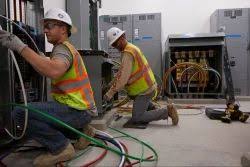Electrical problems in commercial properties can disrupt daily operations and compromise safety. From offices to retail shops, most spaces rely on a stable power supply. When faults arise, quick action is needed to avoid damage and delays.
One of the best ways to prevent recurring issues is to hire a qualified commercial electrician. They not only repair faults but also inspect systems for long-term reliability. This guide covers the most frequent electrical problems in commercial spaces and how to resolve them safely.
Power Outages and Circuit Overloads
Unexpected blackouts can affect sales, productivity, and equipment. In many cases, they result from overloaded circuits or aged switchboards. Older electrical setups may not handle the load of modern devices.
How to fix it:
Have a commercial electrician assess your power usage and distribution. They can upgrade your switchboard or install surge protection. Load balancing also helps prevent outages.
Flickering or Dimming Lights
Flickering lights are often ignored, but they usually indicate wiring issues or poor fittings. Sometimes, voltage fluctuations or loose connections are the root cause.
How to fix it:
Check and replace faulty bulbs first. If flickering continues, call an electrician to inspect fixtures and wiring. An upgrade to LED lighting may also help.
Frequent Tripping of Breakers
Circuit breakers are meant to protect the system by cutting power during faults. If they trip often, there could be an underlying problem. This might be a short circuit or overloading.
How to fix it:
Unplug devices from the affected circuit and test it. If the issue repeats, have an electrician evaluate the breaker and load capacity. Replacing or rewiring may be necessary.
Mild Electric Shocks
Feeling a small shock when touching a device or switch suggests faulty grounding or damaged wiring. This is a safety hazard and should be addressed immediately.
How to fix it:
Stop using the faulty outlet or switch. An electrician can test the earthing system and repair or replace any damaged connections.
Buzzing Sounds and Burning Smells
Unusual sounds or smells from outlets or fixtures should not be ignored. These often signal overheating wires or worn-out components, which could lead to fire.
How to fix it:
Switch off the power in the affected area. Call a licensed electrician to inspect and fix any damaged parts or wiring.
Outdated Electrical Systems
Some commercial properties still operate on outdated wiring. These systems may not meet modern safety standards. They often pose efficiency and compliance risks.
How to fix it:
Ask an electrician to conduct a system audit. If the wiring is old or worn, consider a full or partial upgrade to meet current regulations.
Not Enough Power Outlets
Too few sockets can lead to overuse of extension leads, creating trip and fire risks. This is common in high-usage environments like shops or offices.
How to fix it:
Add more outlets where needed. Avoid overloading single sockets. An electrician can safely install new power points based on your needs.
Poor Lighting Layout
Insufficient lighting can reduce productivity and safety. Poor layout or ageing fixtures often cause dark spots or inconsistent brightness.
How to fix it:
Evaluate the lighting arrangement. Switch to brighter, energy-efficient LEDs. A redesign of light placement may also improve coverage.
Lack of Maintenance
Many commercial spaces only call electricians when faults occur. This reactive approach can lead to larger, costlier problems over time.
How to fix it:
Set up regular maintenance with a licensed professional. Routine checks help identify worn components and prevent serious faults later.
Importance of Relying on Local Experts
Hiring Local Electricians ensures faster service and familiarity with building layouts in your area. They are also more accessible for ongoing maintenance and emergency repairs.
Local Electricians can provide tailored advice and support based on past issues in the locality. Their quicker response times help reduce business downtime and prevent repeat faults.
Working with someone nearby also improves accountability and simplifies future follow-ups. This helps build a long-term relationship based on safety, trust, and reliability.
Conclusion
Commercial properties face a wide range of electrical issues—from power surges to poor lighting. Ignoring these faults can put people and property at risk. Many problems arise from overuse, ageing systems, or a lack of regular checks.
Professional assistance is essential to fix faults and prevent future breakdowns. Whether it’s upgrading the switchboard or installing extra sockets, expert help ensures everything is safe and compliant.
Choosing a trusted local service provider offers added convenience and peace of mind. Their understanding of nearby infrastructure makes them well suited for regular maintenance and urgent repairs.


